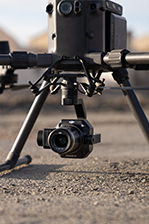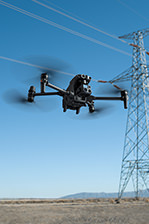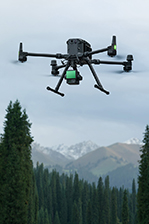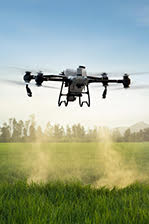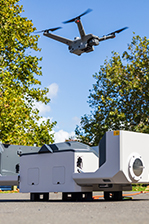DJI Zenmuse H20T
Capture everything up close or from a distance in true living colour or thermal. An integrated laser rangefinder (LRF) measures the distance to an object at up to 1200 m away. A powerful integrated payload that unleashes advanced intelligent capabilities.
Through Ferntech you get FREE Enterprise Shield Cover
Features
All the Sensors You Need - In One
Capture everything up close or from a distance in true living colour or thermal. An integrated laser rangefinder (LRF) measures the distance to an object at up to 1200 m away. A powerful integrated payload that unleashes advanced intelligent capabilities.
Thermal sensitivity |
Visual Sensor |
Laser Range Finder |
Ingress Protection |
| < 50 MK | 12 MP | 3m - 1200m | Level IP44 |

All-In-One

Intelligent Ways to Collect Data


AI Spot-Check
Automate routine inspections and capture consistent results every time. Onboard AI recognizes the pre-marked subject of interest in subsequent automated missions to ensure consistent framing.
High-Res Grid Photo
Frame an area of interest in wide camera view, and the zoom camera will automatically capture a set of 20 MP images of the area. These images are stored together with an overview image that can be viewed in greater detail.
Visualize Temperatures Immediately

Intelligent Features
Temp Alarm
Receive instant notifications in DJI Pilot when object temperatures exceed your preset alert values.
Colour Palettes
Adjust the colours applied to the thermal data based on the needs of specific scenarios.
R-JPEG Images
Images captured by the Zenmuse H20T are in the R-Jpeg format with embedded temperature information. By importing these images into DJI Thermal Analysis Tool, you can measure temperature, and adjust parameters such as Emissivity, and Reflected Temp.
Isotherms
Visualize a specific band of temperatures to find what is important.
Gain Modes
Adjust gain modes to change the temperature range captured: High Gain Mode covers a smaller temperature range but is more sensitive to temperature differences: Low Gain Mode covers a wider temperature range.
Application
.jpg)
Download the brochure from this link
Product Specifications
General
Weight: Zenmuse H20T: 828±5 g
Dimensions: Zenmuse H20T: 167×135×161 mm
Ingress Protection Rating: IP44
Operating Temperature: -20° to 50° C (Temperature Measurement is only available between -10° to 50° C)
Storage Temperature: -20° to 60° C
Laser Safety: Class 1M (IEC 60825-1:2014)
Supported Aircraft: Matrice 300 RTK
Gimbal
Angular Vibration Range: ±0.01°
Mount: Detachable
Controllable Range
Pitch: -120° to +30°
Yaw: ±320°
Mechanical Range
Pitch: -132.5° to +42.5°
Yaw: ±330°
Roll: -90° to +60°
Zoom Camera
Sensor: 1/1.7" CMOS, 20 MP
Lens
DFOV: 66.6°-4°
Focal length: 6.83-119.94 mm (equivalent: 31.7-556.2 mm)
Aperture: f/2.8-f/11 (normal), f/1.6-f/11 (night scene)
Focus: 1 m to ∞ (wide), 8 m to ∞ (telephoto)
Focus Mode: MF/AF-C/AF-S
Exposure Mode: Auto, Manual
Exposure Compensation: ±3.0 (1/3 increments)
Metering Mode: Spot metering, Center-weighted metering
AE LOCK: Supported
Electronic Shutter Speed: 1 ~ 1/8000 s
ISO Range
Video: 100 - 25600
Photo: 100 - 25600
Video Resolution
3840x2160@30fps, 1920x1080@30fps
Video Format: MP4
Video subtitles: Supported
Photo Size: 5184 × 3888
Photo Format: JPEG
Wide Camera
Sensor: 1/2.3" CMOS, 12 MP
Lens
DFOV: 82.9°
Focal length: 4.5 mm (equivalent: 24 mm)
Aperture: f/2.8
Focus: 1 m to ∞
Exposure Mode: Auto
Exposure Compensation: ±3.0 (1/3 increments)
Metering Mode: Spot metering, Center-weighted metering
AE LOCK: Supported
Shutter Speed: 1 ~ 1/8000
ISO Range
Video: 100 - 25600
Photo: 100 - 25600
Video Resolution: 1920×1080@30fps
Video Format: MP4
Video subtitles: Supported
Photo Size: 4056 x 3040
Photo Format: JPEG
Thermal Camera
Sensor: Uncooled VOx Microbolometer
Lens
DFOV: 40.6°
Focal length: 13.5 mm (equivalent: 58 mm)
Aperture: f/1.0
Focus: 5 m to ∞
Digital Zoom: 1x, 2x, 4x, 8x
Video Resolution: 640×512 @ 30 Hz
Video Format: MP4
Image Resolution: 640×512
Image Format: R-JPEG (16 bit)
Pixel Pitch: 12 μm
Spectral Band: 8-14 μm
Sensitivity (NETD): ≤50 mK @ f/1.0
Temperature Measurement Method: Spot Meter, Area Measurement
Scene Range
-40 °C to 150 °C (High Gain)
-40 °C to 550 °C (Low Gain)
Temperature alert: Supported
FFC: Auto/ manual
Palette: White-hot/Fulgurite/Iron Red/Hot Iron/Medical/Arctic/Rainbow 1/Rainbow 2/Tint/Black Hot
Laser Rangefinder
Wavelength: 905 nm
Measurement range: 3-1200 m (to a vertical surface with ≥12m diameter and 20% reflection rate)
Measurement accuracy
± (0.2 m + D×0.15%)
D is the distance to a vertical surface
Features
Hybrid Optical Zoom: 23×
Max. Zoom: 200×
One-Click Capture
One-click to save the video or picture of 3 cameras (zoom, wide and thermal camera) simultaneously
Point to Aim
Double click on the wide/thermal camera view, then the system will automatically move the gimbal to focus on the point of interest
High-Res Grid Photo
Frame an area of interest in wide camera view, and the zoom camera will automatically capture a set of 20 MP images of the area. These images are stored together with an overview image that can be viewed in greater detail.
Night Scene: Supported (zoom camera)
Timestamp: Including GPS, date, and time
Storage
Supported SD Card: MicroSD card (Max capacity: 128 GB, UHS-1 Speed Grade 3 required)
Supported File Systems: FAT32 (≤ 32 GB), exFAT (> 32 GB)
Recommended Micro SD Cards
TOSHIBA EXCERIA PRO 32GB micro SD HC II
SanDisk_Extreme PRO_32GB_3_A1_micro SD V30 HC I
TOSHIBA EXCERIA PRO 64GB micro SD XC II
SanDisk_Extreme PRO_64GB_3_A2_micro SD V30 XC I
SAMSUNG_EVO_128GB_micro SD 3 XC I
TOSHIBA EXCERIA M303E 32GB micro SD HC I
TOSHIBA EXCERIA M303E 64GB micro SD XC I
TOSHIBA EXCERIA M303E 64GB micro SD XC I
TOSHIBA EXCERIA M303 128GB micro SD XC I
SAMSUNG_EVO_64GB_micro SD 3 XC I
In the box
WHY BUY FROM US?
By buying from Ferntech, you'll have the confidence that you are dealing directly with New Zealand's leading drone experts. Our staff are knowledgable drone pilots who offer expert advice, trusted support and superior specialist service. Only through us will you receive a full New Zealand warranty, phone and email support, and access to our certified Repairs Centre with DJI-qualified drone technicians. And we guarantee that we will have the best prices on the market — if not let us know and we will match any price (conditions apply).
Warranty Details
General
How many models are in the Zenmuse H20 Series?
What’s the Ingress Protection Level?
What are the image resolutions of the cameras?
What are the video resolutions of the cameras?
Which video format is supported?
What are the zoom levels of the H20 Series?
What is the minimum focusing distance of the visible cameras of the Zenmuse H20 Series payloads?
What factors affect the accuracy of the laser rangefinder?
What is the frame rate of the thermal camera in the Zenmuse H20T?
30 fps.
What is the accuracy of temperature measurements of the Zenmuse H20T?
What factors affect the accuracy of temperature measurement of the Zenmuse H20T?
What is the difference between high and low gain modes in the thermal camera of the Zenmuse H20T?
Does the thermal camera in the Zenmuse H20T support digital zoom?
What is Flat-Field Calibration or FFC in the Zenmuse H20T?
How many different ways can I measure temperature using the Zenmuse H20T?
Are there different versions of the Zenmuse H20T with different focal length options?
What software can I use to process thermal images taken by the Zenmuse H20T?
What can I do when the lens fogs up?
What can I do when the protective glass to the camera fogs up?
What is Night Scene Mode?
What is High-Res Grid Photo Mode?
What is the maximum Micro SD capacity supported?
Which apps are compatible?
Can I take a still photo while recording a video?
Are timed photos supported?
With which drone platforms are they compatible?
Onto which gimbal port can I mount them?
How do I upgrade the firmware of the Zenmuse H20 Series?
What are some safety precautions that I should keep in mind when using the Zenmuse H20 Series?
For what scenarios can I use the Zenmuse H20 Series?
Can I use the Zenmuse H20 Series for aerial surveying?
There's currently no reviews for this product, be the first to write one.









